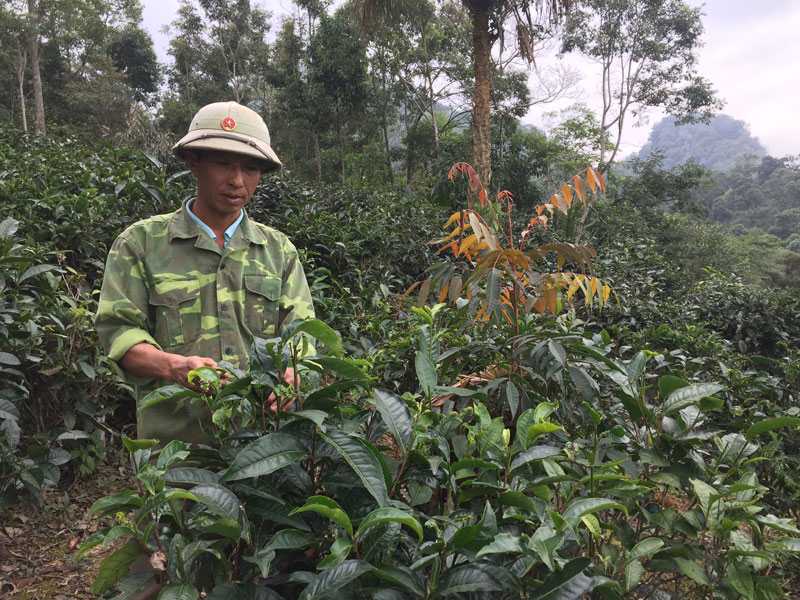
(HBO) - Trung Thanh commune in Da Bac district has maintained 97.9 ha cultivated with two rice crops a year, 160 ha under maize and 80 ha of cassava in accordance with plans. The local animal husbandry also expanded to 16,000 cattle and poultry heads, and 2.2 ha of aquaculture. Meanwhile, the Shan Tuyet tea is considered a key product to help sustainably reduce poverty in the locality. Currently, the Shan Tuyet tea trees are grown on 70 ha of land in Bua, Thuong, and Bay hamlets, of which trees on 40 ha can be harvested.

Thanks to the cultivation of Shan Tuyet tea, Ha Van Pom's family in
Thuong hamlet, Trung Thanh commune (Da Bac) has become better off with higher income.
We
visited Ha Van Pom's family in Thuong hamlet, who have more than 15 years of experience in cultivating Shan Tuyet tea.
Currently, Pom
and his family members are busy taking care of their tea plants, as harvest time is approaching.
Taking us around the tea hill, Ha Van Pom
said: "Compared to maize, Shan Tuyet tea bring us a higher profit at lesser labor costs.
Currently, my family's tea farmhas been expanded to 1 ha. Everyday, three members of the family can collect about 100kg of fresh tea leaves.
The price is stable at 6,000 VND per kg, and each month we earn about17 million VND.The harvest seasonlasts from March to November.”
In
order to facilitate the local
economic development, the commune has cooperated with the
district Bank for Social
Policy to effectively implement
preferential lendingprogrammes, with outstanding debts totalling14.4 billion VND. Training courses on
cultivation and animal husbandryhave been organised annually, attracting 500
participants so far.
In 2018, the Poverty Reduction Project provided 420 million VND to 32 poor households to help them improve livelihoods.
The Vice Chairman of the Trung Thanh People's Committee said that in the coming
time, the commune plans to
continue persuading locals to engage in Shan Tuyet tea cultivation, while working
with enterprises for distribution of tea products.
He also asked for support from public agencies,
sectors and organizations in terms of saplings, capital, and production techniques
to boost product quality.
The commune will continue working to maintain
and expand effective cultivation and animal raising models, thus helping locals
raise income and living standards and achieving sustainable poverty reduction.
More than just an information technology teacher, Bui Van Nien is an inspiring figure who has nurtured the scientific curiosity and creative spirit of students in Vietnam’s ethnic minority communities.
Da Bac is the most disadvantaged mountainous district in Hoa Binh province, with ethnic minorities accounting for about 90% of its population. Over the past years, the district has mobilised resources to implement ethnic policies to improve the quality of life of local people.
In recent years, Hoa Binh province has consistently prioritised the protection, care, and education of children, particularly those from ethnic minorities and disadvantaged backgrounds, by creating a safe, healthy, and nurturing environment for their all-round development.
The Steering Committee for Tobacco Harm Prevention and Control of Hoa Binh province, in coordination with the Tobacco Harm Prevention and Control Fund, held a ceremony on May 28 in response to the World No Tobacco Day (May 31) and the National No Tobacco Week (from May 25 to 31). The event was chaired by Nguyen Van Toan, Standing Vice Chairman of the provincial People’s Committee and head of the Steering Committee.
Since 2021, the Center for Industrial Promotion and Industrial Development Consulting (CIIDC) under the Department of Industry and Trade has been implementing a school lighting model as part of the plan for using energy efficiently and economically in Hoa Binh Province in the pẻiod of 2021 - 2025. This model not only aims to improve the learning conditions and enhance the education quality, but it also promotes the message of energy saving, energy security, environmental protection and contributes to the goals of socio-economic development.
In the 2024 - 2025 school year, the entire Hoa Binh provincial education sector includes 520 educational institutions and schools. Among them are 13 ethnic boarding schools with 153 classes and 4,487 students. Four of these schools have met national standards, reaching 30.7 percent.



